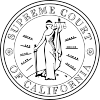| People v. Collins | |
|---|---|
 | |
| Decided March 11, 1968 | |
| Full case name | The People, Plaintiff and Respondent, v. Malcolm Ricardo Collins, Defendant and Appellant. |
| Citation(s) | 68 Cal. 2d 319 |
| Holding | |
| A defendant's guilt must be determined by facts of the case; they cannot be determined by mathematical means, such as statistical probability. Judgement reversed. | |
| Court membership | |
| Chief Justice | Roger J. Traynor |
| Associate Justices | Marshall F. McComb, Raymond E. Peters, Mathew Tobriner, Stanley Mosk, Louis H. Burke, Raymond L. Sullivan |
| Case opinions | |
| Majority | Sullivan, joined by Traynor, Peters, Tobriner, Mosk, Burke |
| Dissent | McComb |
People v. Collins[1] was a 1968 American robbery trial in California noted for its misuse of probability[2] and as an example of the prosecutor's fallacy.[3][4][5]
- ^ People v. Collins, 68 Cal.2d 319 (California Supreme Court March 11th, 1968) ("Mathematics, a veritable sorcerer in our computerized society, while assisting the trier of fact in the search for truth, must not cast a spell over him.").
- ^ Tribe, Laurence H. (April 1971). "Trial by Mathematics: Precision and Ritual in the Legal Process". Harvard Law Review. 84 (6): 1329–1393. doi:10.2307/1339610. hdl:10822/763743. JSTOR 1339610.
- ^ Finkelstein, Michael O.; Fairley, William B. (January 1970). "A Bayesian Approach to Identification Evidence". Harvard Law Review. 83 (3): 489–517. doi:10.2307/1339656. JSTOR 1339656.
- ^ Kreith, Kurt (August 1976). "Mathematics, social decisions and the Law". International Journal of Mathematical Education in Science and Technology. 7 (3): 315–330. doi:10.1080/0020739760070308. ISSN 0020-739X – via Taylor & Francis.
- ^ Suss, Richard A. (October 4, 2023). "The Prosecutor's Fallacy Framed as a Sample Space Substitution". OSF Preprints. doi:10.31219/osf.io/cs248.